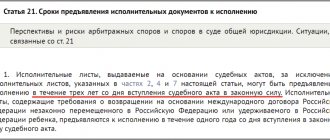What is a court order? Let's give an example of it.
A court order is a document (court order) that is issued by a judge on the basis of an application for the collection of sums of money or for the recovery of movable property from the debtor for certain requirements, if the amount of money to be collected or the value of the movable property to be claimed does not exceed 500 thousand rubles.
Important!
That is, the creditor can apply to the magistrate at the debtor’s place of residence with an application for a court order if the debt does not exceed 500 thousand rubles. A court order is at the same time an executive document and is executed in the manner established for the execution of court decisions (clause 1, part 1, article 23, art. 121, 122, clause 1, article 133 of the Code of Civil Procedure of the Russian Federation).
DEBT COLLECTION
The application for a court order must indicate:
- name of the court to which the application is filed;
- name of the claimant, his location, telephone, fax numbers, email address, bank account details;
- documents confirming the authority to sign an application for a court order;
- last name, first name and patronymic of the debtor, his place of residence or place of stay, one of his identifiers (insurance number of an individual personal account, taxpayer identification number, series and number of an identity document, series and number of a driver's license, series and number of a vehicle registration certificate funds), as well as date and place of birth, place of work (if known), telephone, fax numbers, email address (if known);
- the name of the obligatory payment to be collected, the amount of money constituting the payment, and its calculation;
- provisions of a federal law or other regulatory legal act providing for the payment of a mandatory payment;
- information about sending a request for payment on a voluntary basis;
- the size and calculation of the amount of money constituting the sanction, if it is of a property nature, and the provisions of the regulatory legal act establishing the sanction;
- other documents confirming the validity of the claimant’s claims;
- list of documents attached to the application.
The Supreme Court explained the nuances of issuing a duplicate writ of execution to a new claimant
The Supreme Court of the Russian Federation published a Ruling dated October 27, 2021 in case No. 64-KG20-6-K9, in which it considered a dispute regarding the issuance of a writ of execution to the assignee in a civil case for debt collection under a loan agreement concluded between the assignor and the debtor.
In January 2014, the court recovered over 197 million rubles from Dmitry Plotnikov. debt under a loan agreement in favor of Sberbank PJSC. A few months later, on the basis of a court decision, enforcement proceedings were initiated, within the framework of which 163 thousand rubles were recovered from the debtor. Subsequently, the enforcement proceedings were completed due to the citizen’s lack of property that could be foreclosed on.
Subsequently, Sberbank transferred to LLC Megasakh, under an agreement for the assignment of rights of claim (cession), a credit file for Dmitry Plotnikov, which did not contain the original writ of execution. Although the replacement of the claimant was confirmed in court, the bailiff service sent a writ of execution to the original claimant represented by the bank, which it reported to the Megasah company. Next, the company applied to the court for the issuance of a duplicate writ of execution as part of the case regarding the bank’s claim against Dmitry Plotnikov for termination of the loan agreement, early collection of debt under the loan agreement, and collection of legal expenses.
The court refused to satisfy the request, citing the fact that the period during which the writ of execution could be presented for execution expired on July 6, 2021. As the first instance explained, the company’s application was received three days after this date (i.e. outside the established three-year period for presenting the writ of execution for execution), while it did not contain a request to restore the missed deadline for presenting the writ of execution for execution. The appeal agreed with these conclusions, but indicated that the deadline for presenting the writ of execution for execution expired on April 20, 2021. Subsequently, the cassation upheld the decisions of the lower courts.
In its cassation appeal to the Supreme Court of the Russian Federation, the Megasakh society challenged the judicial acts as illegal.
After studying the materials of the case, the Judicial Collegium for Civil Cases of the Supreme Court noted that the parties did not dispute the loss of the original writ of execution. The highest court reminded that in case of loss of the original writ of execution or court order (executive documents), the court that made the decision that issued the court order may, at the request of the claimant or bailiff, issue duplicates of such documents (Part 1 of Article 430 of the Code of Civil Procedure of the Russian Federation ). An application for the issuance of a duplicate of a writ of execution may be submitted to the court before the expiration of the period established for the presentation of a writ of execution for execution, except in cases where such a document was lost by a bailiff or other person carrying out the execution and the recoverer became aware of this after the expiration of the term established for the presentation of a writ of execution for execution.
In these cases, the Supreme Court explained, an application for the issuance of a duplicate of the writ of execution can be submitted to the court within a month from the day the claimant became aware of the loss of the writ of execution. In turn, writs of execution issued on the basis of judicial acts, in some cases, can be presented for execution within three years from the date of entry into force of the judicial act. The period for presenting the writ of execution for execution is interrupted: by the presentation of the writ of execution for execution; partial execution of the writ of execution by the debtor. After the break, the period for presenting the writ of execution for execution is resumed.
The time elapsed before the interruption of the term is not counted towards the new term (Part 2 of Article 22 of the Law on Enforcement Proceedings). If the writ of execution is returned to the claimant due to the impossibility of its execution, the period for presenting the writ of execution for execution is calculated from the date of such return. When a writ of execution is returned to the claimant due to the impossibility of its execution (including partially), the period of enforcement limitation begins anew from the day of such return.
The Supreme Court also noted that a procedural action for which a procedural deadline has been established can be completed before 24 hours of the last day of the deadline. If the complaint, documents or sums of money were submitted to the postal service organization before 24 hours of the last day of the deadline, the deadline is not considered missed.
The court noted that, as follows from the material and court decisions, the application for the issuance of a duplicate writ of execution was submitted by the company through the postal service organization on July 5, 2021. Taking into account the return of the writ of execution to the claimant on July 6, 2016 and in accordance with Part 3 of Art. 22 of the Law on Enforcement Proceedings, the period during which the writ of execution could be presented for execution expired on July 6, 2021. “Under such circumstances, the conclusions of the courts that the three-year period for filing an application for the issuance of a duplicate writ of execution was missed by the Megasakh company ” and expired on April 20, 2021, are erroneous and not based on the law,” the Supreme Court concluded, canceling the judicial decisions and returning the case for a new trial at the first instance.
Aleksey Sharon, Third Class Advisor to Justice of the Russian Federation, Chairman of the Board of the Regional Public Organization “Association of Veterans of the Bailiff Service”, believes that in the case under consideration, the Supreme Court corrected a trivial error. “After studying the texts of the decisions of the lower courts, we can conclude that none of the courts delved into the seemingly very simple rules for calculating the time limits for filing applications for the issuance of a duplicate writ of execution. Moreover, no one, except the Armed Forces of the Russian Federation, bothered to present in their decision a calculation of deadlines that could be verified,” he noted.
According to the expert, an application for the issuance of a duplicate writ of execution can be submitted before the expiration of the deadline for its presentation for forced execution. “In this case, due to the fact that the enforcement proceedings were completed by the bailiff with a certificate of impossibility of collection on July 6, 2021, therefore, the deadline for its presentation expired on July 6, 2021. The applicant submitted an application for the issuance of a duplicate writ of execution on the last day expiration of the period - July 5, 2021. How the court of appeal came to the conclusion that such a period expired on April 20, 2021, the second instance did not disclose in its judicial act,” emphasized Alexey Sharon.
Anton Grachev, a lawyer in the Arbitration practice of the law firm VEGAS LEX, believes that the ruling of the Supreme Court develops the approach enshrined in the law to calculating the period for filing an application for the issuance of a duplicate writ of execution and directs the courts to more carefully establish the circumstances of the expiration of the specified period, taking into account the method of filing an application for the issuance of a duplicate writ of execution leaf. “In particular, the Supreme Court of the Russian Federation indicated that when determining the deadline for filing an application for the issuance of a duplicate writ of execution, it is necessary to take into account the date of sending the corresponding application to the court of general jurisdiction (in the case when the sending was made by mail), and not the date of receipt of the specified application to court,” he noted.
According to the expert, in judicial practice in cases of issuing a duplicate of a writ of execution, Part 3 of Art. 108 of the Code of Civil Procedure of the Russian Federation, on which the Supreme Court relies, is used quite rarely; courts rarely pay attention to the date when the application for the issuance of a duplicate writ of execution was actually sent to the court. “It seems that the position set forth in the ruling of the RF Armed Forces under consideration will contribute to a more detailed study of these circumstances and will provide the applicant with more opportunities to exercise his rights to obtain a duplicate of the writ of execution,” summarized Anton Grachev.
Director of the Presumption CA Philipp Shishov believes that in the case under consideration, the Supreme Court of the Russian Federation, sharing the position of the claimant, focused on only one argument, namely the rule of law that the procedural deadline is considered to have been met by the party to the case when sending a procedural document by mail before the deadline (July 5, 2021). “It doesn’t matter when the document was received by the court by mail, the date of filing the document for the purpose of calculating deadlines is considered to be the date of sending by mail,” he emphasized.
According to the expert, after reading the text of the ruling of the RF Armed Forces, a number of questions arise, namely: for what reason did the bailiff not return the original writ of execution to the claimant for more than three years (from the end of the enforcement proceedings on July 6, 2021 to June 25, 2021 )? At the same time, the claimant himself believed that the writ of execution had been lost and was forced to apply to the court for the issuance of a duplicate of the writ of execution. This circumstance, including the untimely return of the writ of execution to the claimant by the bailiff service, undoubtedly should also have been taken into account when considering the case by lower courts,” Philip Shishov is convinced.
He added that in the commented ruling of the Supreme Court there is a mention that the lower courts considered the expiration date of April 20, 2021, however, from the text of the judicial act of the highest court, it is unclear what exactly the courts were guided by when determining this date, that is, an exhaustive no assessment was given of this circumstance. “The Plenum of the Supreme Court, in its Resolution No. 23 of December 19, 2003, gave a guiding explanation that the decision is an act of justice that finally resolves the case, its operative part must contain comprehensive conclusions arising from the factual circumstances established in the reasoning part . Such a resolution of the Plenum of the RF Armed Forces is certainly applicable to other judicial acts, in addition to the decision,” the lawyer emphasized.
The following documents must be attached to the application for a court order:
- testifying to the sending to the debtor of copies of the application for a court order and the documents attached to it by registered mail with return receipt requested, or documents confirming the transfer to the debtor of the specified copies of the application and documents in another way that allows the court to verify that they have been received by the addressee;
- a copy of the request for payment on a voluntary basis;
- a document confirming payment of the state duty, if its payment is provided for by the legislation of the Russian Federation on taxes and fees.
DEBT COLLECTION FROM LEGAL ENTITIES
DEBT COLLECTION IN ARBITRATION COURT
What is a court order for debt collection in simple words?
Most often, the subject of litigation is a dispute between citizens, organizations, and entrepreneurs. Or between citizens and organizations. To consider it, a claim is filed, proceedings are held with the parties summoned, and evidence is examined. Based on the results of the claim process, a decision is made and a writ of execution is issued.
Many types of obligations are of an indisputable nature, which is clearly confirmed by documents. Such cases do not require a full trial. If the claimant's claim is undisputed, a court order can be obtained for it.
The legal status of this document in civil proceedings is determined by the Code of Civil Procedure of the Russian Federation:
- writ proceedings are conducted only by magistrates;
- an order from magistrates can be obtained only for obligations expressly specified in the Code of Civil Procedure of the Russian Federation;
- the maximum amount of recovery is no more than 500 thousand rubles, and if this amount is exceeded, a claim must be filed;
- simplified rules are applied for extradition and revocation, including the time limits for legal proceedings;
- in case of cancellation of the judicial act, the claimant is not deprived of the right to file a claim for the same requirements.
Arbitration courts also deal with writ proceedings in certain types of economic cases. To obtain a document through arbitration, it is not the Civil Procedure Code of the Russian Federation that is used, but the Arbitration Procedure Code of the Russian Federation (Arbitration Procedure Code of the Russian Federation). The rules for extradition through arbitration do not differ significantly from civil proceedings.
You cannot receive an order if a decision has already been made at the request of the claimant. The Code of Civil Procedure of the Russian Federation provides for a rule prohibiting repeated recourse to court on a similar subject of dispute. However, magistrates are not required to check whether collection has previously been carried out on the stated requirements. Therefore, it depends only on the active actions of the debtor whether he will face double collection. It is necessary to identify such moments in time and immediately file objections.
How does an order differ from a court decision?
This is a logical question for people who are not familiar with the nuances of the law. So, is the order a court decision or not? According to the Code of Civil Procedure of the Russian Federation, the following judicial acts can be issued based on the results of the case:
- decisions
are made based on the results of consideration of the claim; - orders
- issued only on undisputed demands and without conducting a full trial; - determinations, decisions
- are made on procedural issues, based on the results of consideration of complaints, petitions, applications.
Thus, the order is not a court decision, but refers to judicial acts. The difference is very important, since by court decision you still need to obtain a writ of execution in order to transfer it to the bailiffs. This is not required for writ proceedings.
I received a court order: what next?
The issuance of an order allows you to apply for its forced execution.
For this purpose, the provisions of Law No. 229-FZ are applied. Execution on the basis of an order can be carried out:
- bailiffs
- on the basis of documents received from the claimant or directly from the court; - by the bank
- based on the claimant’s application or by resolution of the FSSP. The debtor's accounts will be frozen or blocked; - by the employer
- based on the claimant’s application or documents from the FSSP, if the amount of the debt does not exceed 100 thousand rubles, or periodic payments (alimony) are collected.
A document certified by the court’s seal must be sent to the FSSP, bank or employer. The bailiffs will notify the claimant about the initiation of proceedings and will inform about the progress of execution.
Validity
The order does not have an exact validity period. However, Law No. 229-FZ specifies the period during which a document can be sent for execution - 3 years. This period is counted from the date of publication of the court act. As soon as the document is submitted for execution to the FSSP, bank or employer, the 3-year period is interrupted.
If production is completed or terminated, the period will begin to run again. An exception is the revocation of the order at the request of the claimant. In this case, the period will continue to run taking into account the previously expired period of time.
Legal advice on appealing a court order
Legal provides professional advice on the issues of canceling court orders in Kazan. We also help restore missed deadlines for filing objections, take on the collection of evidence, and send all the necessary documents to the court. We help clients or act on their behalf by proxy.
Our lawyers have experience in restoring deadlines for cancellation and in reversing court orders. We provide all types of services - from consultations to support of the procedure for returning funds collected under canceled orders. Ready to help even in the most difficult situations. Contact us for a consultation now.







